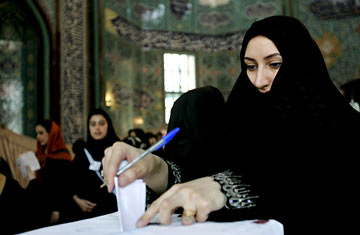
An Iranian woman casts her ballot in the presidential runoff election at a polling station in Tehran
"Take your own pen with you, because at the ballot box they may hand out pens whose ink turns invisible after a while," was one of many mass mobile text messages circulated by the opposition in the tense run-up. "Wouldn't that equally affect Ahmadinejad votes?" asked one confused voter, 19-year-old Farid Shobeiri, who had shown up in Tehran's Vanak Square to show his support for the President's main rival, Mir-Hossein Mousavi. "Of course they'll only distribute those pens in clearly pro-Mousavi stations in north Tehran," was the matter-of-fact response of Shobeiri's older cousin.
But warnings about vote-tampering were not restricted to rumors and hearsay. These past days, both reformist candidates, Mehdi Karroubi and Mousavi, have held press conferences with often threatening tones to warn against vote interference from the ruling government of Ahmedinejad. "I am saying this seriously," announced Karroubi. "This time we are awake and we are aware."
Karroubi was pitted against Ahmadinejad once before, in 2005. While votes were being tallied, he claims, he took a two-hour nap and "awoke to see 1 million votes shifted." In the end, Ahmadinejad made it to the second round by only about 640,000 votes over Karroubi. "Last time, I took a nap after my morning prayer. This time, I'll stay up and read the Koran," Karroubi said smugly to a gathering of reporters three days before the election.
In a press conference earlier in the week, Kamran Daneshjoo, the head of Ahmadinejad's election committee, said the government was expecting a record voter turnout by the country's 46.2 million eligible voters and added that "it makes no difference to us which of the candidates becomes President." Daneshjoo said the government was interested only in holding "morally clean" elections and that according to the law, representatives of the Interior Ministry and the Guardian Council would ensure fairness.
Not everyone is buying it. "All bodies executing the elections are uniformly pro-Ahmadinejad," protested former Interior Minister Ali-Akbar Mohtashamipour, who currently heads the Mousavi campaign's election-supervision committee, at a press conference on Wednesday. "Of course, no interference in the votes can take place except in favor of their own candidate," he said. Mohtashamipour also expressed concerns that Ahmadinejad had received a fatwa to slander some of the Islamic republic's stalwarts, like Ali Akbar Rafsanjani, in televised debates in recent weeks, implying that he could attain further sanctions from hard-line clerics to meddle with votes.
But most observers agree that election results are likely to be meddled with only to a certain extent. "If voter participation is really high, in other words, if the margin of votes between, say, Ahmadinejad and Mousavi is big, interference will not yield decisive results," says Mohammad-Ali Abtahi, a member of Karroubi's central campaign committee. There are 45,713 polling booths across Iran today, and the candidates — Ahmedinejad, Mousavi, Karroubi and former Revolutionary Guard commander Mohsen Rezai — can post one observer at each of the polling booths. Once the votes are counted and recorded at the stations, under the oversight of the observers, the numbers will be passed to the capitals of each of Iran's 30 provinces, where each candidate is again allowed to post an election monitor while votes are counted there.
But challengers are concerned that rigging may take place at mobile ballot boxes — units that are transported to remote locations in cars, buses or planes, into which about a third of the nation's votes will be cast. "They have not provided us with the possibility of traveling with the government team [carrying the boxes]," says Morteza Elviri, a member of Karroubi's election-supervision committee. "They have said, You can follow our cars with your own vehicle, but that's not a reasonable solution," he complains.
Mohtashamipour has also claimed that the government moved polling booths to schools and mosques with strong Basij bases and that entire ballot boxes could disappear or their votes be canceled. One text message circulating during the week instructed Mousavi supporters to vote in schools rather than mosques. The following day, another widely distributed message read, "The SMS you received about voting in schools was circulated by the opposing camp. They want to nullify ballot boxes based in schools, the majority of which will now carry Mousavi's name. Please send to all."
Concerns have also been aired over rumors that thousands of army conscripts had been given leave until Saturday — the day after the elections. To go on leave, conscripts must leave their birth certificates with their army garrisons, which in turn can be misused by others for voting. At a street rally last week, where a group of Mousavi supporters facing a smaller group of Ahmadinejad supporters were chanting, "If there is no cheating, Mousavi will be first," an army conscript said confidentially, "We were told this morning by our commander that we should vote for the current head of government. Ahmadinejad's name was not mentioned, but of course everyone knows who the current head of government is."
"Much more important than rigging are institutionalized drives to get out the vote," says Abtahi. "All that is needed for Ahmadinejad's government is to tell the millions of beneficiaries of the Relief Committee as well as those who are now receiving higher pensions and salaries to vote for him," the former Vice President observs, adding, "And that is legal."
